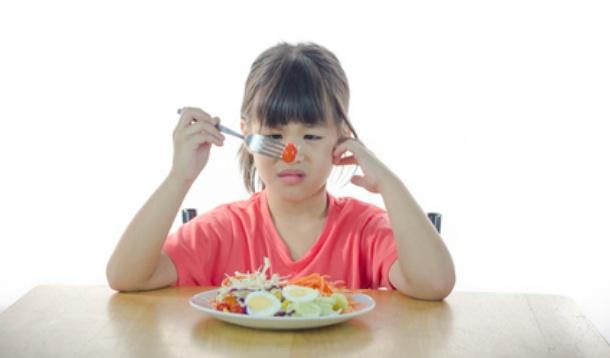
It seems that moms and dads are constantly reaching into their purses, bags, strollers, and pockets for portable snacks to hand to their squirmy tots in malls, indoor playgrounds, on walks, and just about anywhere else. And trust me, I am guilty of it too. I rarely leave the house without a bag full of snacks just in case we are out for longer than planned. But the truth is - although for the most part nutritious - these snacks are sometimes given to my kids for the wrong reasons: in the car to keep them occupied while I'm trying to focus on the road, in the stroller to make long walks home from the park more tolerable, or in the grocery store when I'm waiting in line and don't want to deal with a screaming toddler. When random, all-day munching becomes a habit though, mealtime struggles often ensue.
![]() RELATED: Six Game Changing Questions To Ask Your Picky Eater
RELATED: Six Game Changing Questions To Ask Your Picky Eater
But snacking isn't the problem.
Snacking is not something that we should give up or phase out. In fact, young kids require more frequent eating opportunities than adults do because of their smaller-sized stomachs. And the problem isn't necessarily the types of snacks that are offered (although snacks do tend to be less nutritious, especially when coming from a box or package). It's how and when they are offered that causes problems for our kids. Creating more structure around snacks for my kids has not only improved their overall nutrition, but has made mealtimes much more enjoyable for everyone.
Healthy snacking is important for young kids, to help fill nutritional gaps from mealtimes and to fill their small tummies between meals that are spread apart by more than 3-4 hours. Kids don't, however, need a constant influx of calories around the clock. As kids grow and become older, so does the size of their stomach. Maryann Jacobsen, RD, author of the blog Raise Healthy Eaters and co-author of the book Fearless Feeding mentions on her blog that "By one year, most children are eating about 6 times per day, with the last meal typically consisting of milk or a breastfeeding session. Toddlers tend to eat every 2-3 hours while preschoolers may be able to go 3, maybe even 4 hours between meals." By the time kids are school-aged, they can move to "three meals and one afternoon snack" depending on timing of breakfast and lunch. She also stresses that snacks should be nutrient-dense, as to fill nutritional gaps from meals.

One way that we do this in our house is if my son doesn't drink his milk at breakfast, I might offer yogurt for a mid-morning snack. If he doesn't eat very many vegetables at lunch, I might offer cut up veggies with hummus for an afternoon snack. The typical snack aisle foods such as goldfish crackers, fruit snacks, pretzels, crackers and character-shaped cookies that I often see being handed out by parents are a far cry from nutrient-dense and fill precious space in little tummies that should largely be reserved for healthier fare. These foods, similar to desserts-like foods can be served occasionally (even once a day) to teach the importance of balance and fun, but ideally shouldn't be offered as regular everyday snacks.
![]() RELATED: Why You Should Teach Your Kids To Eat In A Circle
RELATED: Why You Should Teach Your Kids To Eat In A Circle
According to Ellyn Satter, an internationally recognized expert on feeding, parents and caregivers should be in charge of the "when" of eating. Which means, depending on child's age, and the family's routine and schedule, parents set the meal and snack times. For example, in our house where we have a one and a half year old and a four year-old, breakfast is usually around 7:00-7:30am, a snack offered between 10 and 10:30am, lunch is at 1pm, an afternoon snack is offered at around 3:30 and dinner is between 6-6:30. There isn't usually a bedtime snack offered, because bedtime falls at about 7:30-7:45pm, just an hour after dinner. Otherwise, eating would become a food free-for-all in our house. Were my kids are in charge of timing (likely asking for snacks several times a day) I would be left scrambling for snack items all day, only to battle it out at mealtimes. Milk, although nutritious, is filling and is often over-consumed by kids during the day (which can exacerbate or even be the cause of picky eating at meal times). Offer no more than about two cups (500 mL) of milk per day to toddlers over 12 months (about 1/2 cup at or right after mealtimes is fine) and water in between meals.
It's important to realize that kids' eating patterns can be erratic and change from day to day depending on their age, whether they're going through a growth spurt or not and depending on their activity level. Although we as parents set boundaries around timing of meals and snacks, kids should always be in charge of whether and how much they eat at these times - for the most part, kids will eat what they need and leave the rest. They also won't starve if a request for a snack is denied, because they will have another opportunity to eat soon enough. Kids aren't all cut from the same cloth when it comes to eating frequency either. My son (four years-old) has always eaten a lot at meals, whereas my daughter (one and a half) eats smaller portions, so may need more opportunities to eat than my son when she's his age.
When there is structure around meal and snack timing and when eating opportunities are at the same time everyday (with a bit of flexibility of course), kids are better able to learn self-regulation when it comes to hunger and fullness. Natalia Stasenko, Pediatric Dietitian at Tribeca Nutrition mentions on her blog that structure "will help your kids build hunger for mealtimes, eat enough to last till next eating opportunity and stay attuned to their hunger-satiety mechanisms both during and in between meals and snacks." She stresses that a lack of structure means that kids will either not be hungry at the start of a meal or be overly hungry, neither of which are beneficial to a child's overall nutrition or relationship with food. When kids are allowed to snack all day (or drink milk all day), it prevents them from ever having the opportunity to feel true hunger or develop a good appetite for meals. Grazing (or between-meal milk-drinking) poses a much bigger problem for picky eaters, who have a hard time trying new foods to begin with, let alone when they come to the table full on snack foods.

Establishing new boundaries and routines with kids is never an easy task. Resistance is almost inevitable. But kids are resiliant and will adapt quickly (some quicker than others) to changes in routine around meals and snacks. Andrea Nair, YMC's Parenting Expert and Registered Psychotherapist believes that parents shouldn't be afraid to train their children. "When parents approach new routines with a coaching mindset, things tend to go smoother. Although, there might be a period of resistance when something new is learned, change can happen with repetition, empathy and clear instruction." she says. Andrea's popular post "Tantrum Tamers: 32 Phrases To Use With 3-4 Year-olds" might be helpful if you experience some resistance from your kids at first. Ariadne Brill, Parenting Expert over at The Positive Parenting Connection feels similarly, and adds that "A routine is going to take at least a week to feel like a real routine. For parents, if the new boudaries are truly important, then keeping them in place, with kindness will help children also accept them within a few days." Ariadne has a great post entitled "Keeping Limits, Even When Children Become Upset" that might be helpful.

In the beginning, when requests for snacks are made (when it's not time), let your kids know that they are heard and understood by saying "I understand that you want a snack right now" or "it sounds like you're mad that you can't have the snack that you want right now" followed by "even though we can't eat right now, we will have another chance to eat in one hour--when the clock says one o'clock. What would you like to do while we wait until lunch time? Go to the park or do some colouring?" might be a good way to approach it. Kids don't often react well to the answer "no", so if you can reframe your answer as "YES, we can have a snack (or meal), but just not right now" (referencing the future eating opportunity instead), kids are more likely to react positively. At the next meal or snack time, it's important to warn your child of when their next eating opportunity will be. "Make sure that you get enough to eat now, because we won't have another chance to eat until after your little sister wakes up from her nap in 2 hours" (a time reference is always helpful for younger kids).
If you are interested in learning more about how to deal with picky eating, visit my Facebook page, where I post daily tips, resources, articles and recipes.
You might also be interested in reading my post on the 3 most common false assumptions parents make at mealtimes as well as the top 6 game-changing questions to ask your picky eater at mealtimes.

When it comes to nutrition, people can become emotionally invested in what they believe to be true, whether it's that gluten is terrible or that dairy isn't fit for human consumption. It can be a touchy subject, especially if changes in diet have coincided with improved energy levels, weight loss, or decreased digestive symptoms. And when someone becomes passionate about changes in their own nutrition, they often don't hesitate to spread the message. When nutrition celebrities such as the Food Babe, sans credentials, plant pseudosience-filled information into people's brains, and confirm it over and over again using sciencey jargin, it can easily become nutritional gospel for many.
Yesterday's Gawker.com featured a post written by Yvette d'Entremont, an analytical chemist with a background in forensic science and toxicology, about Vani Hari (AKA The Food Babe), and it has gone wildly viral. D'Entremont revealed the fact that Vani is, in fact, not the health and nutrition "expert" she claims to be, and that she has used her massive social media platform to spread pseudoscience-filled messages about the harmful effects of the toxins in our food supply (and our environment) to millions of her loyal followers.
![]() RELATED: 14 Signs Your Healthy Eating Habits Aren't So Healthy
RELATED: 14 Signs Your Healthy Eating Habits Aren't So Healthy
Although Vani is not the only "expert" to spread misleading and - in most cases completely false - messages about food, she has more power than most because she's managed to build an entire empire and gain hundreds of thousands (if not more) loyal followers (the "Food Babe Army") who have joined in her crusade against the food industry. She has even written a best-selling book called "The Food Babe Way" wherein she coaches on how to "break free from the hidden toxins in your food."
As d'Entremont explains in her Gawker post, Hari's Superhero status stemmed from a personal health experience (which it often does with self-proclaimed "experts") where she experienced appendicitis, but wasn't happy with the explanation that "appendicitis just happens sometimes." "So she quit her job as a consultant, attended Google University and transformed herself into an uncredentialed expert in everything she admittedly can't pronounce. Slap the catchy moniker "Food Babe" on top, throw in a couple of trend stories and some appearances on the Dr. Oz show, and we have the new organic media darling", D'Entremont writes.
![]() RELATED: 7 Foods Dietitians Won't Feed Their Kids
RELATED: 7 Foods Dietitians Won't Feed Their Kids
As a Registered Dietitian, I've found that it can be nearly impossible to change someone's opinions on diet and nutrition, even with ample scientific evidence to prove otherwise, because they become passionate about what they know to be true. Although science is ever-changing and we don't know everything (and probably never will), we still know a lot, and basing your food choices on claims made by Food Babe (or insert any uncredentialled "expert" who spreads nutrition quackery) is not your best bet.
But there are actual nutrition experts who make it a priority to stay on top of scientific literature and provide evidence-based advice and messages. As a Registered Dietitian, I took a four-year bachelors degree in human nutrition and food science, and then a year-long dietetic internship, and then a national exam to obtain my RD license. As a Dietitian, I'm accountable to my provincial regulatory body for professional conduct and am required to stay committed to an ethical practice. Registered Dietitians are a trusted source of nutrition information, but there are other nutrition experts who can also be trusted, such as Medical Doctors with a background in nutrition, or people with University degrees in nutrition and food science. On the other hand, having a science degree, or even having multiple letters behind a name, doesn't necessarily qualify someone as a "nutrition expert" or trusted source of nutritional information.
Four red flags to watch for when reading about nutrition or receiving advice from an "expert" are:
Be wary of credentials such as "Nutritionist," "Nutrition Coach," "Holistic Nutritionist," or the like. Although there are many Nutritionists out there who are well-educated and qualified to give sound nutrition advice, "Nutritionist" it's not a regulated term. In other words, anyone can claim the label. Dig deeper to find out what their background is, where they studied and whether or not they have post-secondary education in the field of nutritional sciences. Regulated terms for qualified nutrition professionals in Canada are "Registered Dietitian," "Registered Dietitian Nutritionist," "Dietitian," or "Professional Dietitian" which are all protected by law. Look for the letters R.D., RDN., P.Dt. or D.Pt. after their name, indicating that the person is a registered member of the dietetic profession.
This tends to be the case when special supplements, detoxes or cleanses are are part of a regime. There are no miracle cures, and no quick-fix diets that work sustainably over the long term. A change in lifestyle takes time, a degree of commitment, and needs to be realistic for the individual in order to be sustainable and long-lasting.
Just because one study claims saturated fat isn't as bad as we once thought, it doesn't mean that we can gorge on fast food and dowse everything in butter. The media tends to create a frenzy around studies like this and people translate research findings into new diet mantras. It's best to take glorified claims and "new findings" with a grain of salt, learn how to read and understand research (here's a great post on how to do this) before giving your diet an over-haul based on just one study.
People crave definitive direction when it comes to eating. They want to know which foods are "good" (to fill up on), and which ones are "bad" (to avoid) and want a specific plan of action. That's why diets that eliminate complete foods groups like the Paleo Diet or the Gluten-free Diet are appealing. Unless you have a diagnosed allergy, intolerance or condition (such as a dairy allergy or Celiac Disease), there is no reason to eliminate an entire food group or avoid certain foods at all costs. In reality, there are no "good" or "bad" foods. There are "healthy" and "not-so-healthy" foods, but what matters is what you consume overall during an entire day or week. Restrictive diets may work short-term, but very rarely work long-term and can make it even harder to achieve sustainable weight loss results in the future.
For evidence-based nutrition information and resources (and where to find a Registered Dietitian in your area), check out the Dietitians of Canada website as well as the Academy of Nutrition and Dietetics (US).
Feel free to check out my Facebook page, where I post daily nutrition tips, resources and recipes for parents and kids.